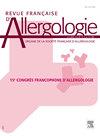Allopurinol-induced Dress syndrome complicated with pancreatitis and ascites: Always look beyond the skin
IF 0.3
4区 医学
引用次数: 0
Abstract
A 54-year-old male patient with a history of hypertension for the past two years was admitted to the dermatology department with pruriginous maculopapular skin rash, facial edema, and fever after the initiation of allopurinol for hyperuricemia six weeks previously. Dermatological examination revealed generalized erythema with scales, facial edema, cheilitis, and lymphadenomegaly. Laboratory tests showed eosinophilia at 2850/mm3, increased liver enzymes (alanine aminotransferase at 821 UI/L, aspartate aminotransferase at 258 UI/L, alkaline phosphatase at 278 UI/L), functional renal failure with creatinine at 74.59 mg/dL, and increased pancreatic lipase enzyme at 508 U/L. Abdominal sonography revealed normal renal size and a low-abundance ascites. The diagnosis of Dress syndrome was confirmed based on the diagnostic criteria of the RegiSCAR group. The incriminating drug was interrupted, and the patient received topical treatment, oral corticosteroids at a dose of 1 mg/kg/day, and supportive care, including rehydration. Clinical and biological remission was achieved. DRESS syndrome is a serious adverse drug reaction. Hepatitis is one of the most frequent visceral manifestations, while pancreatitis occurs in < 5% of cases. Allopurinol-induced DRESS syndrome is associated with significant mortality due to systemic manifestations. Judicious use of allopurinol for accepted indications is the only way to decrease the incidence and morbidity caused by allopurinol-induced Dress syndrome.
别嘌呤醇诱导的Dress综合征并发胰腺炎和腹水:总是把目光放在皮肤之外
患者男,54岁,既往高血压病史2年,6周前因高尿酸血症开始使用别嘌呤醇治疗后出现瘙痒性斑疹丘疹、面部水肿及发热入住皮肤科。皮肤检查显示全身红斑伴鳞片,面部水肿,唇炎和淋巴肿大。实验室检查显示嗜酸性粒细胞增多2850/mm3,肝酶升高(丙氨酸转氨酶821 UI/L,天冬氨酸转氨酶258 UI/L,碱性磷酸酶278 UI/L),肾功能衰竭伴肌酐74.59 mg/dL,胰脂肪酶508 U/L升高。腹部超音波显示肾脏大小正常及低丰度腹水。根据RegiSCAR组的诊断标准确定Dress综合征的诊断。中断犯罪药物治疗,患者接受局部治疗、口服皮质类固醇(剂量为1mg /kg/天)和支持性护理,包括补液。达到临床和生物学缓解。DRESS综合征是一种严重的药物不良反应。肝炎是最常见的内脏表现之一,而胰腺炎发生在胰腺炎。5%的病例。别嘌呤醇诱导的DRESS综合征与系统性表现引起的显著死亡率相关。在公认的适应症中合理使用别嘌呤醇是减少别嘌呤醇所致Dress综合征发生率和发病率的唯一途径。
本文章由计算机程序翻译,如有差异,请以英文原文为准。
求助全文
约1分钟内获得全文
求助全文
来源期刊

Revue Francaise d Allergologie
Medicine-Immunology and Allergy
自引率
33.30%
发文量
349
期刊介绍:
La Revue Française d''Allergologie : un véritable forum pour faire connaître des travaux originaux et permettre la diffusion de l''information auprès de toutes les spécialités concernées par les pathologies allergiques. La Revue Française d''Allergologie (8 numéros par an) est au carrefour de nombreuses spécialités - dermatologie, pédiatrie, ORL, pneumologie, ophtalmologie, médecine interne - qui, toutes, ont à traiter des maladies allergiques. Les symptômes des allergies fondés sur des mécanismes communs sont le plus souvent associés et se succèdent chez un même patient. En forte progression depuis 20 ans, les maladies allergiques sont dans l''attente de perfectionnements et d''avancées thérapeutiques qui permettront aux nombreux patients qui en sont atteints de mieux vivre avec leurs allergies. La Revue Française d''Allergologie se veut donc un véritable forum de discussions et d''échanges entre tous les spécialistes confrontés aux pathologies
 求助内容:
求助内容: 应助结果提醒方式:
应助结果提醒方式:


